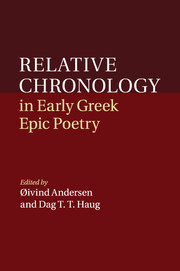Book contents
- Frontmatter
- Contents
- Notes on contributors
- Preface
- Abbreviations
- Introduction
- Chapter 1 πρῶτόν τε καὶ ὕστατον αἰὲν ἀείδειν
- Chapter 2 Relative chronology and an ‘Aeolic phase’ of epic
- Chapter 3 The other view
- Chapter 4 Late features in the speeches of the Iliad
- Chapter 5 Tmesis in the epic tradition
- Chapter 6 The Doloneia revisited
- Chapter 7 Odyssean stratigraphy
- Chapter 8 Older heroes and earlier poems
- Chapter 9 The Catalogue of Women within the Greek epic tradition
- Chapter 10 Intertextuality without text in early Greek epic
- Chapter 11 Perspectives on neoanalysis from the archaic hymns to Demeter
- Chapter 12 The relative chronology of the Homeric Catalogue of Ships and of the lists of heroes and cities within the Catalogue
- Chapter 13 Towards a chronology of early Greek epic
- Bibliography
- General index
- Index locorum
- References
Bibliography
Published online by Cambridge University Press: 05 January 2012
- Frontmatter
- Contents
- Notes on contributors
- Preface
- Abbreviations
- Introduction
- Chapter 1 πρῶτόν τε καὶ ὕστατον αἰὲν ἀείδειν
- Chapter 2 Relative chronology and an ‘Aeolic phase’ of epic
- Chapter 3 The other view
- Chapter 4 Late features in the speeches of the Iliad
- Chapter 5 Tmesis in the epic tradition
- Chapter 6 The Doloneia revisited
- Chapter 7 Odyssean stratigraphy
- Chapter 8 Older heroes and earlier poems
- Chapter 9 The Catalogue of Women within the Greek epic tradition
- Chapter 10 Intertextuality without text in early Greek epic
- Chapter 11 Perspectives on neoanalysis from the archaic hymns to Demeter
- Chapter 12 The relative chronology of the Homeric Catalogue of Ships and of the lists of heroes and cities within the Catalogue
- Chapter 13 Towards a chronology of early Greek epic
- Bibliography
- General index
- Index locorum
- References
- Type
- Chapter
- Information
- Relative Chronology in Early Greek Epic Poetry , pp. 242 - 260Publisher: Cambridge University PressPrint publication year: 2011



